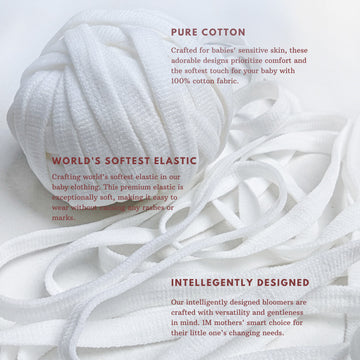Cotton has been a trusted fabric for over 5,000 years, and it remains one of the most popular choices for clothing, bedding, and more. But why is cotton still so beloved in an age of synthetic fabrics? In this blog, we’ll explore the reasons cotton continues to be the go-to fabric for comfort, durability, and sustainability.

1. Breathability and Comfort
Cotton’s natural breathability is one of the main reasons it’s so widely used. Unlike synthetic fabrics like polyester or nylon, cotton allows air to flow freely, which helps regulate body temperature and keeps you cool and comfortable. This makes cotton an excellent choice for summer clothing, baby garments, and even bedding. Cotton can absorb up to 1/5 of its weight in moisture, which means it keeps you dry and prevents irritation or discomfort caused by sweat.
2. Hypoallergenic and Gentle on Skin
Cotton is hypoallergenic, meaning it is less likely to irritate sensitive skin. For those with allergies or conditions like eczema, cotton offers a natural, chemical-free alternative to synthetic fabrics. Doctors often recommend cotton for babies and individuals with skin sensitivities because of its gentle, soft texture. This makes cotton a trusted choice for anyone who prioritizes skin health and comfort.
3. Durability Without Compromise
When cared for properly, cotton fabrics are remarkably durable. They retain their shape and strength even after repeated washing. This makes them an excellent investment for long-lasting clothing and textiles. Cotton also ages gracefully, becoming softer with time without losing its core structure. Whether you're looking for kids’ garments or bedding that will stand the test of time, cotton is a reliable choice.
4. Sustainability and Eco-Friendly Choice
Cotton is not only good for you; it’s good for the planet. As a biodegradable and renewable resource, cotton has a much lower environmental impact than synthetic fabrics. Unlike polyester, which takes hundreds of years to break down, cotton fibers naturally decompose and return to the soil. Choosing cotton over synthetic materials helps reduce plastic pollution and supports a more sustainable future.
5. Cultural and Spiritual Significance
In many cultures, cotton is more than just a fabric—it holds deep cultural and spiritual importance. In India, for instance, cotton has been used in sacred rituals for centuries, symbolizing purity and connection to the earth. Despite the rise of modern fabrics, cotton continues to play a vital role in life’s most significant events, from births to weddings. This cultural reverence adds an extra layer of value to cotton, making it more than just a practical choice.
6. Easy to Care For
Cotton’s practicality extends beyond wearability. It’s easy to care for—cotton garments can be machine-washed and dried without the need for special treatments. Unlike delicate fabrics that require dry cleaning, cotton is low-maintenance, making it an ideal choice for busy families or individuals looking for hassle-free clothing and home textiles.
Why Choose Cotton?
When you choose cotton, you’re opting for a fabric that’s natural, sustainable, and timeless. Whether it’s for its comfort, durability, skin-friendly qualities, or eco-conscious impact, cotton remains unmatched. Plus, its long history and cultural importance add to its enduring appeal. With cotton, you’re not just choosing a fabric—you’re making a choice for comfort, health, and the planet.
Cotton is an enduring favorite due to its breathability, comfort, durability, and sustainability. It’s hypoallergenic, making it gentle on sensitive skin, and its natural fibers help regulate body temperature by absorbing moisture. Cotton is also biodegradable, reducing environmental impact compared to synthetic fabrics. Its cultural and spiritual significance, particularly in traditions and rituals, further adds to its value. Easy to care for, cotton remains a top choice for everyday clothing and special occasions alike. This blog explores these qualities, emphasizing why cotton is an ideal fabric for both comfort and sustainability.

